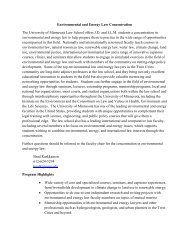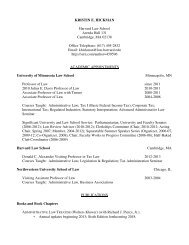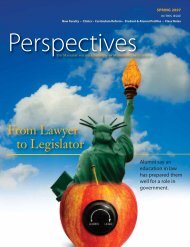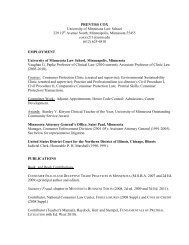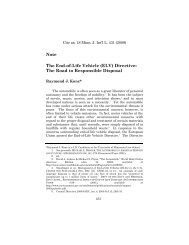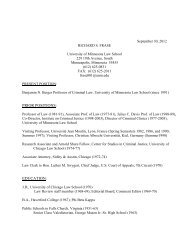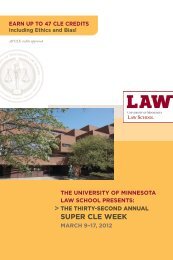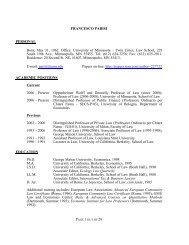Enabling Private Ordering - the University of Minnesota Law School
Enabling Private Ordering - the University of Minnesota Law School
Enabling Private Ordering - the University of Minnesota Law School
You also want an ePaper? Increase the reach of your titles
YUMPU automatically turns print PDFs into web optimized ePapers that Google loves.
2009] UMBRELLA CLAUSES 9<br />
Zauberlehrling, arbitral tribunals seem to be afraid <strong>of</strong> <strong>the</strong><br />
independent lives umbrella clauses could assume once released<br />
into uncontrollable freedom: “Spirits that I’ve cited/My<br />
commands ignore.” 15<br />
Certainly, <strong>the</strong> main reason for this concern is <strong>the</strong> lack <strong>of</strong><br />
textual and interpretative guidance provided by investment<br />
treaties for alleviating <strong>the</strong> multiple insecurities surrounding<br />
umbrella clauses. In particular, only having regard to <strong>the</strong><br />
wording <strong>of</strong> most umbrella clauses, without a conceptual<br />
framework <strong>of</strong> <strong>the</strong>ir function, scope, and effect in mind, will<br />
hardly solve <strong>the</strong> difficult interpretative conundrums connected<br />
with <strong>the</strong>ir implementation and application. Similarly, academic<br />
writing only <strong>of</strong>fers glimpses into a more conceptual framework<br />
for <strong>the</strong> function <strong>of</strong> umbrella clauses. Such writing is particularly<br />
scarce in drawing connections between <strong>the</strong> different<br />
interpretations <strong>of</strong> umbrella clauses and <strong>the</strong> economic effects<br />
<strong>the</strong>se interpretations have on investor-State relations, although<br />
investment treaties intend to establish a framework “to protect<br />
and to promote foreign investment flows between <strong>the</strong><br />
contracting State parties.” 16 This objective suggests that<br />
investment treaties aim at establishing institutions that govern<br />
<strong>the</strong> relations between <strong>the</strong> State, <strong>the</strong> economy, and individual<br />
economic actors, 17 and that are conducive to increasing transborder<br />
investment flows and eventually economic growth and<br />
development. 18<br />
Surveillance S.A. v. Islamic Republic <strong>of</strong> Pakistan, ICSID (W. Bank) Case No.<br />
ARB/01/13, Decision on Objections to Jurisdiction, para. 167 (Aug. 6, 2003) (arguing<br />
that a broad interpretation would be too burdensome on contracting parties); see<br />
also Gill et al., supra note 1, at 405 (commenting that <strong>the</strong> Tribunal in SGS v.<br />
Pakistan feared that a broad interpretation <strong>of</strong> <strong>the</strong> clause would “potentially open <strong>the</strong><br />
floodgates” to an unlimited number <strong>of</strong> reciprocal or unilateral commitments by <strong>the</strong><br />
host State independent <strong>of</strong> <strong>the</strong>ir legal status in domestic law); Wälde, “Umbrella<br />
Clause” in Investment Arbitration, supra note 4, at 215 (discussing arguments for<br />
why <strong>the</strong> Tribunal in SGS v. Pakistan feared “opening <strong>the</strong> floodgates”).<br />
15. JOHANN WOLFGANG VON GOETHE, Der Zauberlehrling, in GOETHE, THE<br />
LYRICIST 102, 109 (Edwin H. Zeydel trans., The <strong>University</strong> <strong>of</strong> North Carolina Press<br />
1955) (1779).<br />
16. See DOLZER & STEVENS, supra note 3, at 11–13, 20–25, on <strong>the</strong> object and<br />
purpose <strong>of</strong> investment treaties and <strong>the</strong> statements contained in <strong>the</strong>ir preambles.<br />
17. See DOUGLASS C. NORTH, INSTITUTIONS, INSTITUTIONAL CHANGE, AND<br />
ECONOMIC PERFORMANCE 3 (1990) (stating that institutions are “rules <strong>of</strong> <strong>the</strong> game<br />
in a society or, more formally, are <strong>the</strong> humanly devised constraints that shape<br />
human interaction”). Contracts and dispute settlement mechanisms for <strong>the</strong>ir<br />
enforcement are institutions in this sense.<br />
18. For a discussion <strong>of</strong> <strong>the</strong> connection between institutions and growth, see THE<br />
LAW AND ECONOMICS OF DEVELOPMENT (Edgardo Buscaglia et al. eds., Jai Press<br />
1997); Jean-Philippe Platteau, Institutions, Social Norms, and Economic



